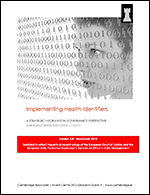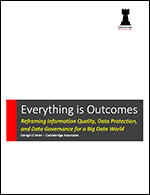A Primer on Ethical Principles in an Information Governance Framework
€0.00 excluding VAT
Ethics is the new black in Information Management these days, or so it seems.
From the European Data Protection Supervisor publishing an Opinion on Big Data Ethics, to countless articles about the call from data scientists for clarity on ethics, there is a growing consensus that “something must be done”.
However, much of the discussion of Ethics takes place in the abstract, and the real challenge in commercial and not-for-profit organisations is ultimately what happens in reality when the organisation is faced with the power of modern information management capabilities. Ethics risks being seen as another “tick box” item to be taken care of by the “Ethics people”, just as Information Quality is often seen as the role of the “Quality department”.
This challenge is not limited to Big Data and affects all aspects of information management in organisations. Big Data has just served to make the issue more high profile. For example, the systemic rigging of engine emissions tests by Volkswagen is not a Big Data issue, but raises many of the same ethical challenges in information management.
Ultimately, ethics and ethical behaviour are a component of the overall Quality System for the management of Information and need to be understood in a way that can enable effective ethical management of information, whether for Privacy or for some other value, such as Trust.
This paper:
- Sets out a structured, first principles based framework for ethical decision making in the processing of data, primarily from the perspective of personal data and privacy, recognising the importance of Societal culture in shaping ethics.
- Maps a conceptual framework for aligning the Ethic of Society, the Ethic of the Organisation, and the Execution of Information Management in a model that focusses on the outcomes experienced by individuals in society as a result of the processing. This framework enables the alignment of Business, Information, and Technology, with Ethics to deliver expected Information and Process outcomes to individuals. It also shows how organisations can influence society’s expectation of “quality” outcomes.
- Identifies the dichotomy that can exist in organisations driven purely by traditional narrow focus on profit margins or other “core missions”, and the importance of change management to align Societal and Organisational Ethics with Information Governance in the organisation
- Maps the conceptual framework to the high level principles set out by the European Data Protection Supervisor to show how the goals identified can be met through a structured approach to the management and governance of information that recognises the Business, Information, and Technology domains that must be aligned for effective Information and Process Outcomes for individuals.
(Thanks to Dr Paul Bernal at the University of East Anglia for his comments on an earlier draft of this paper).




